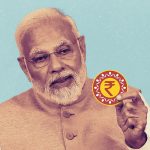The Price of a Wink
A dynasty which once sprinkled stardust has been reduced to sawdust
/wp-content/uploads/2019/05/Wink1.jpg)
THE CLUES LAY all around us, pebbles scattered in different corners of public discourse; or occasionally wrapped in whispers, at the edge of the narrative rather than the main story.
The reasons for victory and defeat in something as momentous as an Indian General Election are far more complex than any one factor, and yet an event or an incident can become a metaphor that defines the larger story.
For Rahul Gandhi, it was the wink that finally lost it.
It was an unbelievable end to a bizarre speech in the Lok Sabha last year. Advised by foreign consultants and puffed up by the politically illiterate but socially vociferous elite echo chambers of Lutyens’ Delhi, Rahul Gandhi led a vituperative assault on Prime Minister Narendra Modi, accusing him of corruption in the Rafale purchase without either an iota of evidence or a modicum of sense. Then, in a gauche gesture he tried to claim some sort of higher morality by saying that he actually wanted to hug the PM. When he returned to his seat in the Lok Sabha he promptly confirmed that all this was cheap theatrics. He winked at his cheerleaders in the galleries. This was caught by cameras and became the image of immaturity, smug cunning and childish demeanour that confirmed an existing feeling that he was unfit for office. As Harsimrat Badal, from the front benches of the NDA, asked: What had he been smoking?
No one found Rahul Gandhi winking at anyone on May 23rd. Certain conclusions are self-evident. Rahul Gandhi has not won a single seat for any Congress candidate, although he has ensured the humiliation of a generation of party leaders, most notably Jyotiraditya Scindia in the family bastion of Guna. Congress has got less than 10 seats between Gangotri and Sagarmatha in the Bay of Bengal. Congress has got less than 10 seats between Maharashtra and Odisha; which means that Rahul Gandhi has destroyed the credibility of three Congress governments which came to office less than six months ago. As if this was not enough, Rahul Gandhi’s disastrous leadership has killed the alliance government in Karnataka. Congress numbers, such as they are, come from Punjab, Tamil Nadu and Kerala. In Punjab Congress has won only because of Captain Amarinder Singh. In Tamil Nadu, Congress won only on the shoulders of a resurgent DMK. And in Kerala, paradoxically, Congress and UDF reaped the benefits of a tremendous anger against the Marxist government because of its stand on Sabarimala. The paradox lies in the fact that it was BJP which mobilised the anger but was in no position to harvest the field that it had sown.
The alibis are already being cooked in some depressed Congress- consultancy oven. One is polarisation. At the moment of writing, too many specific details are not available, so let me mention one seat in Bihar—Katihar; and four in Bengal—Malda North and South, Jangipur and Burdwan. All are dominated by Muslims. Congress lost everywhere despite putting up former President Pranab Mukherjee’s son Abhijit Mukherjee as candidate in Jangipur, a constituency with around 75 per cent Muslim voters. Trinamool won Jangipur, but the person who came second was BJP’s Mahfuza Khatun. Is anyone going to seriously argue that Mahfuza Khatun did not get any Muslim support?
In Burdwan, the winner was the BJP’s irrepressible SS Ahluwalia, who had shifted south from Darjeeling. This seat was once known as Stalingrad because the Communists called it invincible. Then Trinamool won, and it became Mamata’s fortress. Ahluwalia was dismissed as a non-serious candidate by his opponents when he filed his nomination. And then began the turnaround.
Both the seats in Malda were also in the ‘invincible’ category, this time for Congress, since they were fiefs of the Ghani Khan Chowdhury family. Both have gone to BJP. In Katihar, the Congress candidate was Tariq Anwar. He won against the Modi wave of 2014 on Sharad Pawar’s ticket. Last year, he joined Congress in the hope of greater glory. Bad decision. He lost.
Rahul Gandhi’s wink was caught by cameras and became the image of immaturity, smug cunning and childish demeanour that confirmed an existing feeling that he was unfit for office
Rahul Gandhi has paid a catastrophic price for his vicious attacks on Modi, and in particular, for accusing him of corruption. The voter was not ready to accept this charge. Worse, this charge was being made by a dynast whose family album is full of characters like Quattrocchi, the middleman of the Bofors deal. Exaggeration is part of the electoral ethic. Everyone tries to pump as much air into the balloon as it can possibly hold. But one touch of falsehood and the balloon explodes in your face. Rafale boomeranged at what might be called “Jupiter velocity”.
Two factors, push and pull, control the momentum of an election. Anti-incumbency is the slow accumulation of small or big resentments that push away the electorate. This accelerates if there is a pull from a magnetic alternative, as Narendra Modi was in 2014. The 2019 election has been remarkable because the equation was reversed. It was the incumbent, Narendra Modi, who pulled in voters, and it was Rahul Gandhi who pushed them away. The combination turned Congress into camphor. It disappeared into thin air.
The Marxists disappeared into hot air. They became a victim of their own self-importance. Perhaps this happens when the leadership takes its feed from the ivory towers of Delhi instead of the working-class boroughs of Bengal, or the peasant groups of Kerala. Who would have believed that CPM would have only one MP in the Parliament of 2019?
The signs of a Modi victory were visible in numerous ways. I will mention a few. Even in cities like Bengaluru where Congress was in power, Rahul Gandhi’s long cavalcade was often greeted with chants of ‘Modi! Modi! Modi!’ There was no instance of any Modi rally being interrupted by any call of ‘Rahul!’ When some desperate strategist, clearly reading the negative effect of Rahul Gandhi, decided to rope in Priyanka Gandhi, something quite curious happened. She did not become an answer to Narendra Modi; she became, for the diminishing number of Congress loyalists, a replacement for Rahul Gandhi.
If you wanted to check the mood of Maharashtra, you might have done so through a picture published in April in the Hindustan Times. Nandurbar is one of those ‘remote’ districts that come as a pleasant surprise; it has wildlife sanctuaries, a hill station and the Narmada. On April 22nd, Pratik Chorge took a telling picture of eight-year-old Priyanshu Machhale in the audience. He was dressed as Narendra Modi, with an extremely well-crafted grey beard and a local turban, his right arm stretched straight up. Around him were village women, a few with approving smiles, most with proud and determined faces, one waving the ‘V’ sign for victory. A mother and her friends were showing their support for Modi in a very touching way. The newspaper recognised the implicit truth of the image.
I cannot recall anyone wanting to dress up like Rahul Gandhi.
Priyanka Gandhi did not become an answer to Narendra Modi; she became, for the diminishing number of Congress loyalists, a replacement for Rahul Gandhi
Another signal: when Congress stalwart Sushil Shinde sought help to infuse some energy into his listless campaign, he did not ask for Rahul Gandhi or Priyanka Gandhi. He sent out an SOS to the proto-Shiv Sena leader Raj Thackeray. Congress leaders know that the dynasty which once sprinkled stardust has been reduced to sawdust.
The diminution of dynasty has been one of the by-products of this election. Modi reduced the concept of dynasty into a leech that sucked opportunity and upward mobility away from the less fortunate. He practiced in the BJP what he preached to others. There was no automatic inheritance in the Modi scheme of things. The voter got the message. By the afternoon of May 23rd, a telling truism was in circulation:
Ashok Gehlot’s son is losing. Rajiv Gandhi’s son is losing. Madhavrao Scindia’s son is losing. Tarun Gogoi’s son is losing. Ajit Pawar’s son is losing. Murli Deora’s son is losing. HD Kumaraswamy’s son and father are losing. The only son winning is Son of the Soil.
Just after I read this came a super joke: Tomorrow, Rahul Gandhi will give his resignation to Rahul Gandhi which will be rejected by Rahul Gandhi because Rahul Gandhi says resignation is not a solution of problems created by Rahul Gandhi. Rahul Gandhi will then request Rahul Gandhi to continue to guide the Congress which Rahul Gandhi will accept and thank Rahul Gandhi for reposing faith in Rahul Gandhi.
Touche.
NARENDRA MODI ANNOUNCED his manifesto for the General Election of 2019 from the ramparts of the Red Fort on 15th August, 2014. Every Prime Minister had mourned poverty and then left it to economists. Narendra Modi remembered the talisman of Mahatma Gandhi: look at the face of the poor and check whether you had done something practical to ease that pain. Among the many memorable sections of that speech, the one I will never forget is the trauma that women had to go through in the absence of a private toilet.
When Jawaharlal Nehru was in power, the Nobel Prize winner VS Naipaul wrote a book that scorned India as an area of darkness after he saw Indians on their haunches in open fields. Neither Nehru nor his daughter mentioned toilets. Modi did not need any foreigner’s book to learn about India; he built over 75 million toilets and has now announced the next phase of this mission, which is ensuring a steady supply of clean water. Sanitation coverage rocketed from 38 per cent in 2014 to 83 per cent in 2018.
Five years after the Red Fort speech, do the math. Over 300 million new bank accounts were opened for those without money. Over 100 million took Mudra loans, with three- quarters of the beneficiaries being women and half from the backward castes. Some 50 million smoke-filled kitchens got gas cylinders. Over 10 million new homes were delivered to those with bare accommodation. About 125 million soil health cards were distributed. Over 40 million farmers got crop insurance. It would be logical to assume that at least half-a-billion low-income Indians benefited in some form or the other in the last five years. Why would they not want Modi back?
Why are the great intellectuals of Delhi surprised that Narendra Modi increased the BJP vote by 10 per cent?
In 2014, there was phenomenal hope; by 2019, this had become phenomenal trust. The poor are never foolish; they cannot afford to be. The cost of stupidity is their next meal. They do not think that if they are living in a hut, someone will wave a magic wand and put them in a palace. But if they are eating two rotis in a meal, they have every right to demand four. They got that, and more.
In one sense, this has been a 1971 election, but with a radical difference. Indira Gandhi also created a decisive constituency from the base, while picking up support along the slopes, to the surprise of pundits who were scouring the skies for bright stars and planetary movements. The crucial difference is that Indira Gandhi’s promises remained promises. Narendra Modi improved, visibly and radically, the quality of life of the poor.
Indira Gandhi nationalised banks in the name of the poor; Modi took the poor into banks and gave them something which they never had, financial security. Of the 300 million-plus new bank accounts, about 13 million were opened for the girl child.
Narendra Modi remembered the talisman of Mahatma Gandhi: Look at the face of the poor and check whether you had done something practical to ease that pain
Indira Gandhi divided hope into 20 points, and then left it all to an undernourished snail-government; Modi implemented hundred-plus projects at unprecedented pace, shifting the focus from the languorous trundle of poverty alleviation to the hectic demands of poverty elimination by 2022. Confirmation of his success also came from a counterintuitive source. Why did Rahul Gandhi never mention Jan Dhan, Shauchalaya, gas cylinders, Aawas Yojana, Ayushman Bharat or Mudra in his speeches? Because they were working. If they had failed, they would have been at the top of his agenda. Silence always has a story to tell.
On one subject, however, silence might have served the Congress President well. The bewildered Indian voter had no clue what he meant when he kept insisting that he loved Modi, curiously using only the English word even when he was speaking in Hindi, as if there is no Hindi word for love. Even if you leave aside the cultural associations of a word reinvented in the acid-filled flower-child era of the 1960s, the Indian voter could not understand why Rahul Gandhi was using such vile abuse for the same person. What was that all about? Now that the hurlyburly’s done, this shall remain a mystery.
THE CONGRESS BRAND was fraying long before these elections; Rahul Gandhi ripped it into shreds. We should have asked ourselves why Mamata Banerjee decided to drop ‘Congress’ from all its publicity material just before this campaign. After all, she had included ‘Congress’ in the name only because it once added value. Now, it has moved into counterproductive territory.
This was further reflected in alliance politics. Mayawati and Akhilesh Yadav rejected Congress; it is evident from the results that they were absolutely right. In Bihar, Laloo Yadav was more generous, but again Congress brought nothing to his table. Rahul Gandhi’s scuttle from Amethi to Wayanad said it all.
But the most fascinating contest was surely in Bengal, not least because Mamata Banerjee was as shocked as her predecessor Buddhadeb Bhattacharjee had been in 2011, when the Marxists were overwhelmed by Mamata. I suppose no one told her the jokes that were rampant in Bengal. Not all of them were brilliant, but they were all home-baked. Check: Mamata cannot run away from BJP because NAMO is in the middle of TRINAMOOL.
When, in an appalling misjudgement, Mamata Banerjee attacked ‘Jai Sri Ram’, the most effective answer came not from political opponents but from the people. A joke went viral. Some 20 miles north of Calcutta is a bustling riverside city called Srirampur. Bengalis began to say that they can’t buy a train ticket to Srirampur anymore, they have to ask for a ticket to Begumpur. The joke scorched through a net of interconnected tiers.
A government can survive anger; it is far more difficult to survive ridicule.
Sam Pitroda was a gift that went on giving. According to his close associates, he actually began to believe that he would become the Manmohan Singh of 2019, that Rahul Gandhi would not be prepared to take the office of Prime Minister himself, and would summon a consistent loyalist like Pitroda for the honour. Delusions have a diarrhoea effect on the tongue. It was bad news for the BJP when Pitroda was ordered to shut up after his “Jo hua, so hua” dismissal of the 1984 carnage against Sikhs. If Pitroda had continued to give interviews, the BJP tally could have risen even higher.
THE SUREST EVIDENCE of a major Modi victory was provided by the English magazine called The Economist, when it ran a blistering, biased and putrid onslaught against the Prime Minister. This once-venerated paper has rarely got an election right. It doesn’t select a Delhi correspondent until it has found someone with a solid tin ear. The moment The Economist declared Narendra Modi would lose, everyone should have become certain that he would win.
The consequences are stark. Congress has been reduced to a Kerala plus Tamil Nadu party, where it has won seats only because of allies. Rahul Gandhi owes his own victory in Wayanad to the Muslim League, which is another dismal first for Congress: this is the only time in its long history that a Congress president has had to beg for votes from the Muslim League.
There is bad news for many family-dominated parties. Mamata Banerjee’s mojo has crumbled; her visible tension during the campaign has been justified by the results. This momentum will lead to her defeat in the Assembly elections of 2021. A whispered message across Bengal has become precisely correct: “Unnishey half, Ekushey shaaf (Halve her seats in 2019, finish her in 2021)”. Naveen Patnaik has held on in Odisha, but his party is only an embodiment of his personal presence. In the next five, a lot of political space will open up. Since the only Congress reaction to this humiliation will probably be to elect Rahul Gandhi president for life, it will not be able to occupy this space. The contest will be between BJP and regional parties.
At the start of this election, writing in your favourite magazine, I had mentioned that a ‘wave’ has become a trope in political discourse, but no one quite understands a fundamental characteristic of a wave. It is never visible until it reaches the shore. Only those who never believed that a tsunami was on the way have been drowned.
Also Read
Other stories of General Election 2019

/wp-content/uploads/2025/04/ToC-Cover-Pahalgam.jpg)














More Columns
Hindu lives too matter: US spy chief Tulsi Gabbard Open
The Line Must Move Shubhrastha
Khadi sector scaling new heights even as FMCG giants incur losses Open